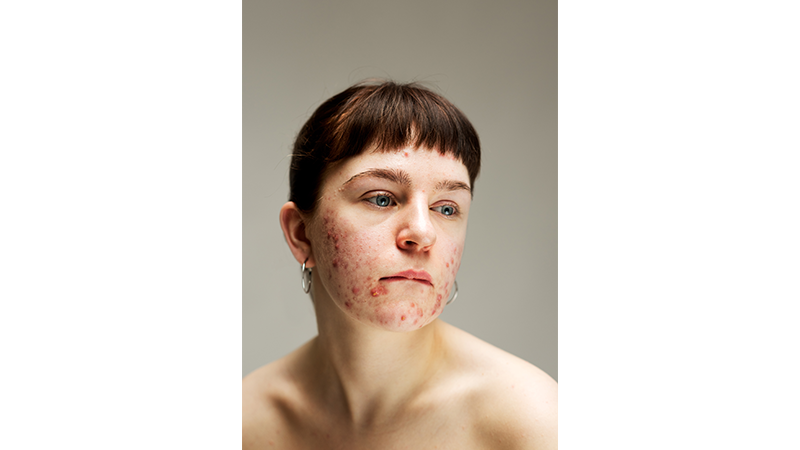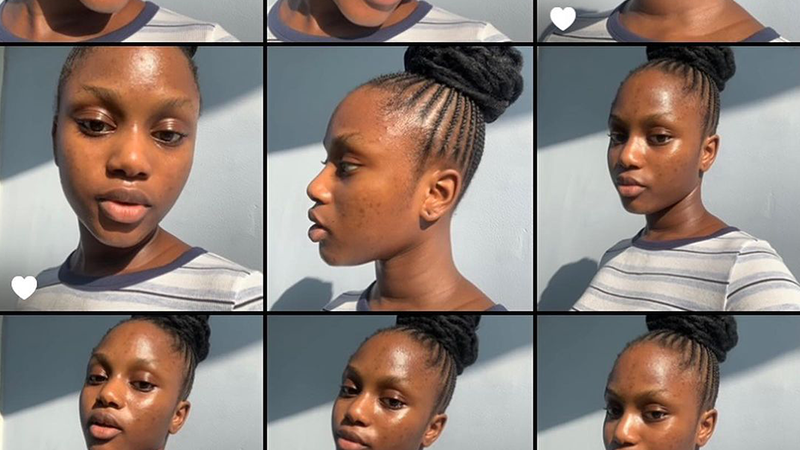What Happened To The Skin Positivity Movement?
In 2019, I felt a shift. While working at a UK women’s magazine, I started to hear more conversations – from colleagues, readers and on social media – about acne, eczema and how, maybe, baby-smooth skin on adult women was an unrealistic pipedream to sell. The way society spoke about skin was changing – and as someone who suffers from psoriasis, it felt validating. For the next year I worked on photoshoots featuring models with vitiligo, acne scars and hyperpigmentation. I wrote about influencers in the shiny new ‘skin positivity’, or ‘skin acceptance’, movement. My social media feeds started to embrace #FILTERDROP and #InstagramVsReality; TikToks of women zooming in on their pores and texture went viral.
Then, just as quickly as it came, the movement went. I noticed there were fewer and fewer examples of ‘real’ skin textures on my feeds, in magazines and in skincare adverts. But it wasn’t just drop-off in popularity; any progress that had been made actually seemed to reverse. Our tolerance for ‘imperfect’ skin lessened in direct proportion to the sudden rise of trends such as ‘glass skin’ (the quest for skin so clear and dewy it looks translucent), which has 4.4billion views on TikTok. Social media users’ reliance on smoothing filters shot up (191.2million people have used the hyper-realistic TikTok filter Bold Glamour) and an almost maniacal approach to skincare has taken hold, most notably evidenced by the current ‘Sephora kids’ trend, which went viral for showing youth across the US mass-flocking to the skincare retailer.

But you know what didn’t go? Our acne scars, our psoriasis, our eczema patches, our textured skin, our hyperpigmentation, our vitiligo, our keratosis pilaris. Our normal, natural skin. It’s still here – like it always will be – yet, if marketing and influencers were to be believed, in 2024 we now have to pretend it doesn’t exist.
Oyintofe Oduyingbo, a ‘skin realist’ and beauty influencer, is one of the few voices out there pushing against this mass-smoothing to her 5.5k followers. Speaking with Service95, she explained: “My journey with skin positivity began in 2020 when I faced challenges with acne, hyperpigmentation, and dark spots, affecting my self-esteem. During the lockdown, I made some skincare mistakes that worsened my condition.”
Oduyingbo saw the skin acceptance movement peak in 2020, with more skinfluencers addressing real issues. Since then, she’s also experienced the decline of skin positivity content on social media, thanks to the rise of unreachable skincare ideals and the growing popularity of filters. “There’s an ongoing focus on embracing healthy skin,” she says, which she feels fuels “the pressure for perfect-looking skin… especially with the prevalence of filters on picture and video-sharing platforms”.
While a focus on skincare over makeup may sound like a positive thing, knowing our retinoids from our ceramides has only made us more convinced of the notion that a ‘flawless’ complexion is achievable for all. That the answers to our skin issues are to be found in expensive 10-step skincare routines, LED facemasks, fillers and injectables.
But, of course, some skin conditions cannot simply be ‘fixed’. Take my psoriasis, for example. It’s chronic and I’ve only found successful treatment through injecting myself twice a month with a biologic drug. No amount of double cleansing could achieve that.
Alexandra Mills, an award-winning medical skincare expert with over 20 years of experience, believes that the normalisation of filtered images on platforms such as TikTok has undoubtedly warped societal perceptions of beauty. “These visual enhancements can create unrealistic beauty standards and perpetuate a culture of comparison and dissatisfaction with natural appearances, particularly among younger audiences,” she says. “The impact of this trend is especially concerning as it coincides with the increasing obsession with skincare, often targeting young girls, and can potentially lead to unhealthy attitudes towards beauty and self-image,” she adds.
In her clinic, Mills has noticed this pressure influencing cosmetic treatments. “The emphasis on achieving this unrealistic standard of beauty has shaped consumer behaviour, prompting a surge in the consumption of skincare products, cosmetic procedures and beauty techniques aimed at attaining the appearance of flawlessness and digital perfection.”
The first step of skin acceptance has always been just that – acceptance, coming to terms with the fact that our skin will never look like it does in filters. We have a responsibility to young girls to steer this car around; to not filter our faces (or be honest when we do), to be transparent about the cosmetic treatments we get and the £1,000s spent on skincare annually.
In a recent US study, 67% of respondents cited skin issues as holding them back from feeling confident. It’s clear we need to change the narrative around perfect skin and the idea that reaching this level of ‘perfection’ is even possible. In the era of AI, FaceApp and an obsession with a constant merry-go-round of skincare trends (snail mucin, anyone?), we’ve lost our way.
Mills concurs, telling me: “Ultimately, the normalisation of beauty filters and the obsessive focus on skincare targeted at young girls underscores the need for a concerted effort to promote realistic beauty standards, foster media literacy, and encourage self-acceptance.”

5 Skin Positivity Influencers To Follow To Unfilter Your Feed
- @oyintofe.o – Oyintofe Oduyingbo is a ‘skin realist’ who shares fun, upbeat videos on how she treats her cystic and hormonal acne.
- @isofiagrahn – Follow Sofia Grahn for unfiltered reminders of the beauty of real skin texture.
- @cottyconcha – A beacon of self-love and acceptance, Constanza Concha shares gorgeous images of her acne scars and body hair.
- @getyourskinout – A community raising awareness of people living with visible skin conditions
- @cystur – Patsy Chem is a vocal advocate for overcoming shame around skin conditions and embracing ourselves as we are.
Chloe Laws is a London-based journalist, poet, and founder of FGRLS Club, a platform fighting misogyny




